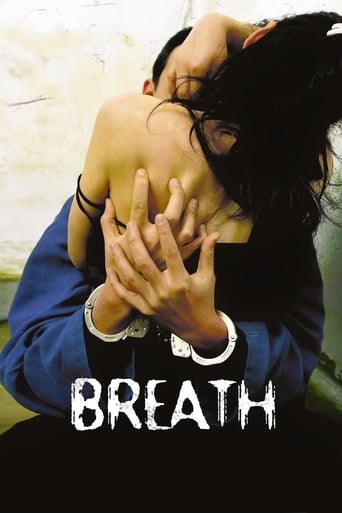



Pretty good movie overall. First half was nothing special but it got better as it went along.
View MoreIn truth, there is barely enough story here to make a film.
View MoreNot sure how, but this is easily one of the best movies all summer. Multiple levels of funny, never takes itself seriously, super colorful, and creative.
View MoreStory: It's very simple but honestly that is fine.
Filmmaker Kim Ki-duk, is widely known for his films that offer loads of violence. He has been Controversies favorite child. But, in his 2007 flick 'Soom' aka 'Breath', he tries his hand in an awkward, yet charming love-story, that hardly offers any bloodshed.'Soom' is about love, redemption, sadness & lies. The lead characters share an outstanding novelty, when-ever they meet eye to eye. It's a tale of a notorious condemned criminal & a housewife. The emotions they discover, the love that is build, comes out brilliantly, at most parts.The only shortcoming, is it's finale. It's weird, and leaves no impact. This 80-minute feature, offers 60-minutes of pure genius, but falters in it's final 20-minutes. Kim Ki-duk delivers as a filmmaker. He has directed the film with complete understanding. The Cinematography is striking. The performances by all of the actors, are memorable.On the whole, A film that is Worth-Watching, without a shed of doubt. It's so different, and so amusing at times, you can't help but like this attempt.
View MoreSouth Korean author Kim Ki Duk is famous for the manner in which he takes an obscure idea to weave a convincing story around it.He is so good at his craft that even highly improbable ideas are transformed into remarkably good films which not only provide wholesome entertain but also make potent cultural statements about South Korean society.By making such socially relevant films,he reveals what kind of people South Koreans are.This is also the case with Kim Ki Duk's film Soom/Breath.It is a different matter if people start to take to heart the behavior of South Korean people based on his films.This is a film where viewers get to see a frustrated wife wearing her heart on her sleeve.After critically acclaimed "Bin Jip",this is the second film by Kim Ki Duk which talks about a neglected wife with a highly unusual end.A positive thing about this film is that despite initial differences matters are sorted amicably between a bickering couple.Tit for tat seems to be the film's message as Kim Ki Duk suggests that if a man cheats his wife, there are high chances that she would also do the same.
View MoreOf the limited number of Korean auteur Kim Ki-duk's movies, I have only seen a handful of them, and mostly they are the relatively contemporary movies, like The Bow, 3-Iron and Time. The feeling I got from them all is consistent - that it's not your usual storytelling, as he seemed more often than not to obscure any intended message, or meaning in his tales, much like searching for an Easter Egg, or worse, that needle in the haystack to get something out of it. If I can summarize his movies in a statement, then it'll be to expect something that's totally unexpected, though not necessary always in a good way.The main draw here for his 14th film, Breath, is Taiwanese actor Chang Chen. I was curious how Kim would be directing him in one of his movies, and as it turned out, because of the obvious language barrier, it's a convenient cop out to have his death row inmate Jang Jin (even his character's name bears semblance to his own) made a suicide manic, choosing to maim his voicebox so that there isn't a necessity to speak at all. Why he's in jail we're not sure, and in true Kim Ki-duk style, his inmate buddies who share the same cell, are not your ordinary gangster looking characters with big tattoos. While two of them are quite bland, there's an effeminate inmate who has a liking for Jang Jin, but gets time and again brushed aside when he demonstrates and emotes jealousy.Housewife Yeon (played by Park Ji-ah) discovers that her husband is cheating on her, and given the media attention on Jang Jin and his suicide attempts incessantly hitting the news, she decides to get back at her husband by striking a relationship with him, posing as an ex-girlfriend, and finding therapy in Uncle Jang. But before you say "boring", what made her character a little bit impossible to believe is the lengths she'll go to just to spice up the visitor's session according to seasons, and of course, add some colour, life and song to a meandering dull movie. She does impossible feats of wallpapering, which I thought would be more credible it they weren't so well done.For half the movie, we see a one way street between Yeon and Jang Jin, she finding an outlet to vent her frustrations, while he finding it amusing to have a total stranger bring forth some fresh air, though artificial, injected into his imprisoned four walls. While there are of course issues of morality here that could be made for points of discussion, by the time the ending rolls around, these are indeed tossed out the window in double quick time. I suspect that 90% of the 10 members of the audience were here because of the tantalizing poster of Chang Chen's mouth on boob (the film has an M18 rating by the way), and it's not rocket science that the ah-peks were probably here for only one thing.But alas, that, it doesn't deliver, but what it does cement very surely, is that you'll never know what to expect from a Kim Ki-duk film, who becomes his own voyeur as he spies on the duo from the CCTV Cameras fed back to the confines of his security office. Unfortunately, Breath turns out to be a time waster, and you'll find yourself cheering at any moment that could have possibly breathed life into a dull movie. Perhaps art movie lovers out there could find some meaning if they look hard enough, but here, I'm calling out that the Emperor is naked.
View MoreIn Dancer in The Dark, Lars von Trier told the story of a girl who could create such a vivid interior life that it could soar over any misfortune, even death. In Breath, Director Ki-duk Kim tells the story of a girl who tries to transfer a similarly strong vision to a condemned man on death row.What do you do to raise your spirits? Listen to a song? Walk through the countryside? Go on holiday somewhere nice? Take any of these things, and they are heightened if love and desire are added.When I was seventeen, I used to walk five miles every night. Just to hold my sweetheart's hand and kiss her goodnight. Even in winter, I felt as if I were walking on air. Sounds kinda stupid, looking back. Especially as it didn't last. But those miles disappeared in seconds.Breath opens unremarkably. Jang Jin is on death row and attempts suicide by sharpening a toothbrush and stabbing himself with it. (He's played by Chen Chang, the sexy outlaw suitor to Zhang Ziyi in Crouching Tiger, Hidden Dragon.) The incident makes the evening TV news.Yeon's husband is having an affair. He tells her to get out and meet people instead of staying at home making sculptures. On an impulse, she goes to visit Jang Jin. On a subsequent visit, she decorates the visiting room with blown-up pictures of spring, fills the area with artificial flowers, and sings to him. She wears a summer dress even though it is mid-winter. Yeon's poetry of life has a profound effect on Jang Jin. They fall passionately in love. But trouble brews from Jang Jin's jealous cellmates and Yeon's violent husband.When Breath started, I admit I found it less than engaging. But suddenly these scenes that Yeon constructs for Jang Jin explode with a powerful emotional force. Have you ever been on one of those simulator machines where you step in and it starts moving about, replicating sensations that match the screen in front of you? It's that sudden. One second you are watching an ordinary prison drama, interspersed with inconsequential domestic stuff. Then Wham! You are suddenly catapulted, knocked sideways, jolted out of your seat. And that, of course, is a pale reflection of the effect we realise it must be having on Jang Jin. We start living for these intense (yet emotionally draining) moments in the film, just as Jang Jin does.Throughout precisely architectured cinematography, Ki-duk Kim weaves a poetry of life and death. "We are already crazy inmates on death row. Until we can breathe no more." Contrasts between the two protagonists' lives outside the meeting room and what goes on inside are mirrored in verbal contrasts where one person will speak and the other stays mute. Breathing in and breathing out. Locked in a passionate kiss. Or holding one's breath underwater.Breath also has a bitter edge. Is she preparing him for the moment when he takes his last breath? (South Korea is one of the very few fully developed democracies where the death penalty is still allowed.) Don't expect any nice redemptive ending. Like Dancer in The Dark, Breath mostly gets darker. "Even though I call with sorrow, Only the white snow falls." It may also be too laboured even artificial for some audiences.Breath is an icy, chilling love story. It looks at a bond that goes beyond the simplicities of life and death. And it's as finely chiselled as a piece of sculpture. Some scenes contain a rare combination of animal intensity and poetic tenderness. The whole unfolds as a dazzling testament to the artistry of Ki-duk Kim.
View More